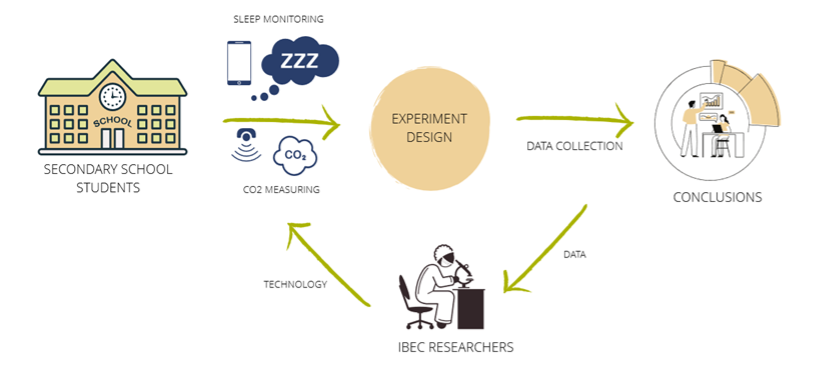Citizen science is the involvement of the public in scientific research – whether community-driven research or global investigations. IBEC is committed to increasing the impact and involvement of society in its research.
Beyond open access to publications and data, we will actively encourage our scientists to uptake Open Science practices such as the involvement in citizen science projects, or the use and creation of open educational resources.
PROJECTS
Research Creation and Service
The project Research Creation and Service involves secondary school students in a citizen science project. Students participate in the design and data collection phase of an experiment as an active learning approach involving in-person experience. These activities contribute to raise awareness and build capacity for students’ participation in projects for society.

Within this framework, IBEC has participated in two projects:
- The quality of the air we breathe in the classroom: Measuring CO2
With this project we propose to measure a series of parameters that will characterize the level of pollution and comfort in the classroom, including temperature, humidity, CO2 concentration and noise level at different times. We will investigate the variables that control the level and temporal evolution of these indicators, and we will highlight the importance of ventilation to improve the quality of the air we breathe.
- Sleep quality: what are the variables that affect rest?
With this project we suggest you measure your sleeping position as well as analyse what your position changes are. This variability in sleeping position (whether there is movement) can be measured by a mobile application developed by IBEC researchers that will be made available to students and teachers.
Engineering Life, Designing Our Futures: A Conversation on New Biological Systems
EMBL and IBEC aim to contribute to the discussion on challenges and opportunities in the expanding field of multi-cellular engineered living systems (M-CELS), in this we organized a special session to discuss with high school students their views on these new biological systems and the implications for the future of medicine and our understanding of what life is. With this activity IBEC and EMBL would like to highlight the importance of the involvement of citizens in the processes of research and innovation and their commitment towards and open and inclusive science. Multi-cellular engineered living systems (M-CELS) are living cellular systems engineered for specific functions. Scientists in this rapidly developing field of research are quickly learning how to test new drugs and more on actual human tissue systems grown outside the human body. However, as with any developing research, there are many ethical questions surrounding it and we wanted to hear from 50 students for an introduction to M-CELS and to dive into a morning of conversations around the questions: What are these new biological systems?, How do we decide if they’re “alive”?, Who will benefit from this research?
OTHER RESOURCES
EU Citizen Science, the platform for sharing citizen science projects, resources, tools, training, etc.
CitizenScience.gov , the US Government platform on Citizen Science.
Observatorio de la Ciencia Ciudadana en España, es un proyecto de la Fundación Ibercivis en colaboración con la Fundación Española para la Ciencia y la Tecnología (FECYT)-Ministerio de Ciencia e Innovación, que tiene el objetivo de recopilar los proyectos de ciencia ciudadana llevados a cabo en España, con el fin de darles difusión y de crear una red de colaboración y participación entre los distintos agentes implicados: científicos profesionales, científicos ciudadanos, gestores, dinamizadores, políticos, divulgadores y comunicadores de la ciencia.
The Barcelona Citizen Science Office, it’s mission is to support citizen science in Barcelona by advising, accompanying and promoting projects that want to work in the city and its Metropolitan Area, as well as developing actions aimed at bringing citizens and research closer together and strengthening the connection with new civic and cultural agents.
SciStarter, is a globally acclaimed, online citizen science hub where more than 3,000 projects, searchable by location, topic, age level, etc, have been registered by individual project leaders or imported through partnerships with federal governments, NGOs, and universities. It’s features enable SciStarter’s partners (libraries, schools, museums, Girl Scouts and more) to catalyze customized citizen science pathways and track and support the progress of their communities through SciStarter. SciStarter also supports researchers in managing projects, including best practices for engaging participant partners.

